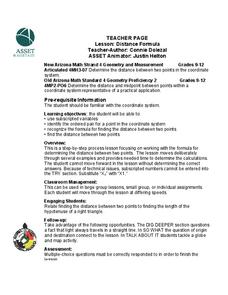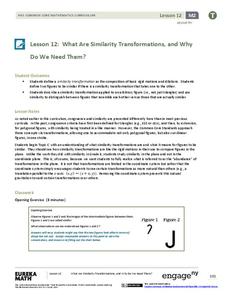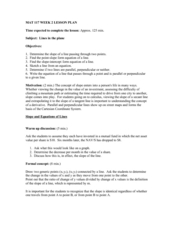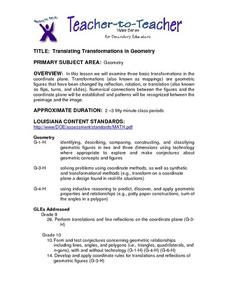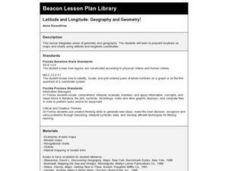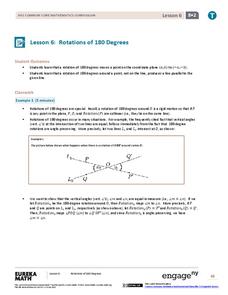Curated OER
Bird and Dog Race
Your pupil's pet dog and bird are racing down the city streets. In order to know who is going to win, they better know something about calculating rates, the Pythagorean Theorem, and applying those topics to the map of the city.
Curated OER
Distance Formula
Young scholars calculate the distance formula. In this geometry lesson, students find the distance between two points on a coordinate plane. They identify the four different quadrants.
EngageNY
What Are Similarity Transformations, and Why Do We Need Them?
It's time for your young artists to shine! Learners examine images to determine possible similarity transformations. They then provide a sequence of transformations that map one image to the next, or give an explanation why it is...
Curated OER
Expressing Geometric Properties with Equations
Algebra and geometry are not interchangeable. Demonstrate why not with a series of problems that deal with the equations of circles and equations of lines that meet specific criteria.
Curated OER
Lines in the Plane
Students differentiate between parallel and perpendicular lines. In this algebra lesson, students graph linear equations using the slope intercept form. They classify lines based on their slopes.
Curated OER
Algebra/Geometry Institute Summer 2007: Graphing Activity
Seventh graders practice identifying coordinates by examining a city map. In this graphing lesson plan, 7th graders create coordinate directions on an index card and practice locating these locations on a grid. Students read...
Curated OER
Translating Transformations in Geometry
Students create an image using given coordinates and evaluate how the coordinates change when a slide or rotation takes place.
Curated OER
X Marks the Spot
Fourth graders use games and puzzles to explore co-ordinate systems and their uses. Students are given the opportunity to invent their own systems by locating counters on a sheet of paper and by finding the dead center of a set of objects.
Curated OER
Latitude and Longitude: Geography and Geometry!
Second graders use latitude and longitude coordinates to pinpoint an exact location on the map. In this geography instructional activity, 2nd graders utilize handouts from the Maritime Museum in order to gain practice in finding...
Curated OER
Complex Analysis: The Complex Derivative
In this complex derivative worksheet, students determine the circle of a radius under the mapping principle. They identify analytic functions, and explore the relationship between real and imaginary parts of complex functions. This...
Curated OER
Where Did It Come From?
Pupils research island formation, plot locations on a map and make an analysis of why some islands are formed where they are.
Curated OER
Science: Hurricanes As Heat Engines
Students conduct Internet research to track the path of Hurricane Rita. They record the sea surface temperature of the Gulf of Mexico during and after the hurricane and draw conclusions about how hurricanes extract heat energy from the...
Curated OER
Student Exploration: Summer and Winter
In this recognizing the seasons online/interactive worksheet, students explore the Earth's positions and determine the summer and winter season. Students answer 21 short answer questions
Teach Engineering
Club Function
Let's get the herd to follow the rules. The activity associated with the second lesson in the unit introduces the class to the definition of a function. Individuals must gather in groups of zebras and rhinos defined by the general...
Curated OER
Separate Vacations
High schoolers plot the migration paths of birds using latitude and longitude data from a table.
Curated OER
Gridding An Archaeological Site
Students investigate using some of the basic skills of an archaeologist while using a Cartesian coordinate system. They establish a grid system for a dig site and determine the locations for different artifacts. Students use the...
Curated OER
Quad Squad
Students pretend they have visited a forest research station on an overnight field trip. They study forest fires, use compass directions, read maps, interpret imagery, and think about the impact of fire on ecosystems.
Curated OER
Topo Triangulation
Students investigate how to read a topographical map and triangulate with just a map. They convert a compass measurement to a protractor measurement, reverse a bearing direction, and using a worksheet take a bearing of certain landmarks...
Curated OER
Osprey Journey
Young scholars investigate the migration route of one bird, Osprey B4, using information gathered from satellites to track birds over a two-year period. They coimpare their graphs with maps of B4's migrations that have been plotted by...
Curated OER
Geometric Transformations
Learners examine images and preimages of a mapping and identify isometry. They view images by M.C. Escher, observe teacher demonstrations, and create a translation image, a rotation image, and a dilation.
Curated OER
Rescue!
Students explore movement and position concepts. They follow directions using left , right, up, down, North, South, East and West. Students draw and follow a path on a grid to show a route followed. They label and follow legends on a map.
Curated OER
Complex Analysis: Transformations
In this transformation instructional activity, students find the linear transformation of equations and use the Mobius transformation to identify image boundaries. Students describe the images in each quadrant. This two page...
EngageNY
Rotations of 180 Degrees
What happens when rotating an image 180 degrees? The sixth lesson in the series of 18 takes a look at this question. Learners discover the pattern associated with 180-degree rotations. They then use transparency paper to perform the...
Curated OER
Two Reasons for the Four Seasons
Students explore the reasons for the seasons. In this season lesson,students use flashlights to demonstrate the movement of the Earth and how it influences the seasons. Students label pictures and discuss what would happen if the...



